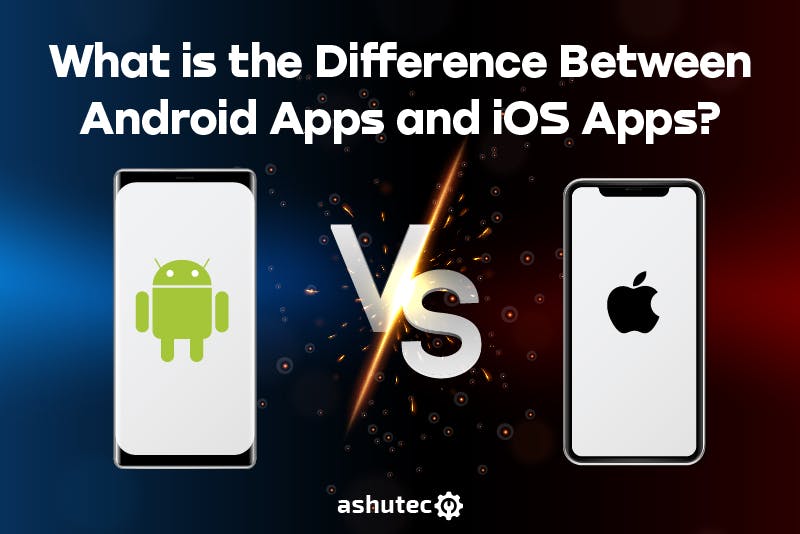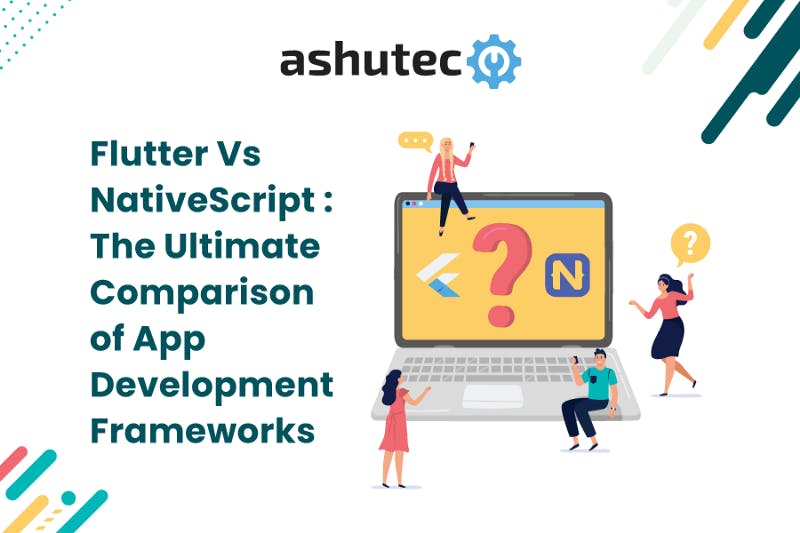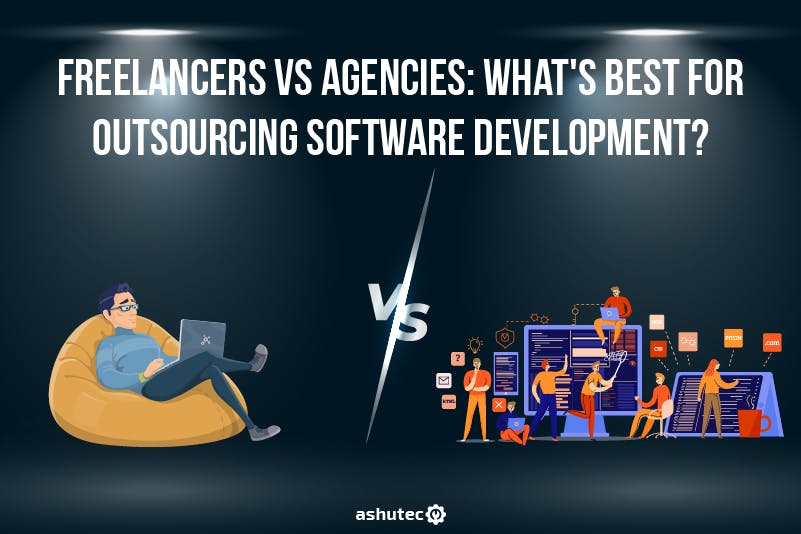Let’s Connect!
Work can be a fun when we know and understand each other well. Let's start conversation to new beginning
+91 63542 35108
To discuss what we can do for you Give us a Call
connect@ashutec.com
Tell us about your next project Write to us
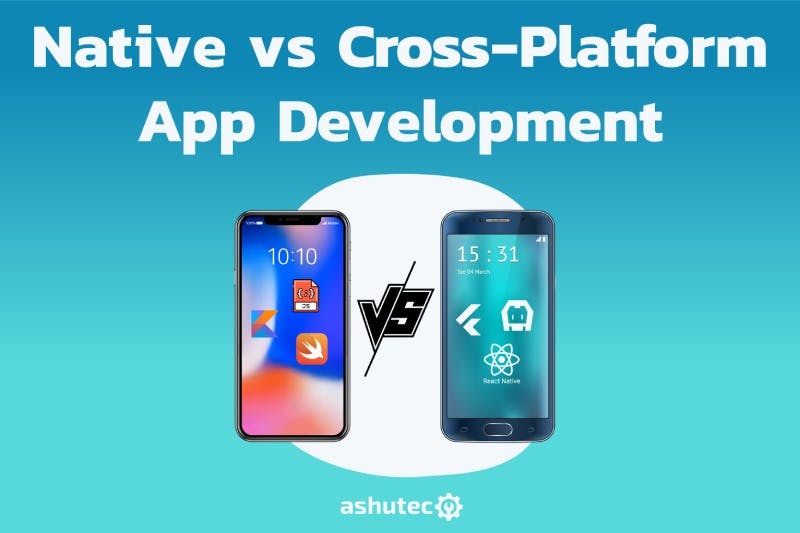
Mobile phones play an incalculable role in our daily lives and activities. Mobile phones have undergone an enormous metamorphosis and are no longer the common communication tools they once were. Nearly 60% of people actively utilize mobile devices to access the Internet as of the fall of 2022.
Mobile apps are becoming more widely available, which has a notable impact on how people perceive and use computers. A revolution in the technology sector was the creation of mobile applications.
It is wise to avoid using technology purely for its own sake. Select a development strategy based on your particular needs and put into effect improvements that offer your team significant advantages. Cross-platform and native app development is simply: instruments for achieving certain business goals.
Many people consider the simple arcade game "Snake," which appeared on the Nokia 6110 in 1997, to be the first mobile application. On the initial iPod, there were a few built-in games, like Brick and Solitaire.
In 2007, the first commercially successful iPhone was produced, and a year later, Native App development programs were launched. Let's discuss how developing mobile applications for native and cross-platform platforms differ from one another.
The process of building a mobile application specifically for an operating system, such as iOS or Android, is known as Native app development. The platform-specific methodologies and programming languages are used to create native apps.
Native apps have higher user engagement than hybrid apps because they are created specifically for the operating system. Compared to their web-based competitors, which must support several platforms, native mobile apps typically run and appear better.
The development of native applications is more challenging than that of mobile web pages. Native mobile apps do not function in the browser. They have to be downloaded through platform-specific app stores, such as Google Play and the Apple App Store.
The Google Play Store currently offers more than 2.9 million apps. On the other hand, the Apple App Store has 4.75 million apps accessible.
In addition, there are several more native app development features that frequently make these the first option when considering the development of a mobile app. Native apps account for a large number of mobile applications such as Whatsapp, Spotify, and Pokemon Go.
Now that you are aware of native platforms and native apps, let's go through their advantages and how they might assist your company.
Since they are built with the platform's main programming language and APIs and are optimized for that particular platform, native apps are swift and responsive.
Compared to cross-platform or hybrid solutions, native apps perform better. Mostly due to the absence of middleware and the application's direct interaction with native APIs.
The development of native mobile apps is primarily carried out on a single platform, which makes them operate more quickly. An application runs more quickly the less heavily loaded it is. Only specific programming languages and architectures can run and compile it. The processing, loading, and runtime of the app are faster on the device.
While the majority of hybrid apps depend exclusively on the security of the system browser, native apps are protected by multiple OS layers, making it difficult to abuse them.
Web applications are dependent on various browsers and supporting technologies like JavaScript, HTML5, and CSS. An excellent method to provide your users with trustworthy data protection is by creating a native mobile app.
Native applications only use official APIs that have been thoroughly tested across various operating system versions and don't rely on any third-party systems. One infrastructure houses the encryption for the data.
Developers who utilize Google and Apple's platforms are provided with respective software development kits (SDKs), interface elements, and development tools. Access to SDKs facilitates faster development and allows programmers immediate access to the newest features.
The extended development of official platform SDKs boosts the probability that they will be able to mitigate every escalating security issue.
Native apps should work with just one platform, so they can be set up easily. Native applications' architecture makes it possible to handle more user traffic and a greater load.
The fundamental architecture of both iOS and Android makes it relatively simple to add new functionality.
Apps created for the native environment are more scalable due to the adaptability of resource management and the diversity of tools available. The native apps are more adaptable thanks to the tools and resource management features.
Maintaining two distinct apps in one codebase is more challenging than maintaining two apps in two codebases. You won't rely on a cross-platform solution like Cordova or Xamarin while developing native apps, therefore problems are less likely to occur.
To develop apps with the most recent features, native app developers have access to the most recent software development kits (SDK). This time lag allows users of native apps to benefit from platform improvements after updating the operating system.
Hybrid applications can connect to hardware via a bridge, but doing so can occasionally cause app development to delay and result in a frustrating user experience. When new iOS and Android versions are released, this issue is present.
Your software is nothing without offering a simple and enjoyable UI/UX, therefore don't demand too much from it. Nevertheless, there are specific rules for iOS and Android that can be found to assist you in creating a user-friendly interface that ultimately offers a more substantial user experience.
User experience is a key component that attracts and keeps users in today's mobile applications.
An effective and platform-specific user interface is simpler to implement when native programming methods are used.
The excellent UI/UX implementation improves the application's performance, which also increases users' enjoyment of the software.
Building a single mobile application that works well across several different operating systems is possible with cross-platform mobile development. The development of cross-platform applications is getting more and more popular.
Startups can cut expenses and shorten development time by using it because it can run on a variety of mobile devices. Developers can produce and distribute mobile assets that are compatible with both Android and iOS without having to record them for each platform separately.
It indicates that the business can release the product more quickly and with higher quality. Due to its compatibility with many mobile operating systems, the application can reach a larger audience.
To create a cross-platform mobile app, you can use a variety of frameworks. Mobile cross-platform developers use a single language for writing their code. The build process maps this universal code to the applicable platform when the app is built.
In order to create a cross-platform application, there are two different approaches: Hybrid app development, which uses Ionic and Cordova, and native cross-platform mobile app development, which uses React Native, Flutter, NativeScript, and other technologies.
A cross-platform app can typically be developed faster and distributed to a larger audience. On the other hand, it can be inefficient if it necessitates redundant processes or file storage directories for the numerous systems it is meant to support. Firefox, Chrome, and VLC are some famous cross-platform applications.
Mobile engineers can avoid writing new code for each operating system by using cross-platform programming. It is significantly easier for developers to write a single codebase for both platforms.
A developer will consider the rest of the codebase as well as any upcoming features when developing something like a form component.
Developers can still make changes and updates to an app after it has been published in app stores for mobile devices.
Developers can save time by using a single codebase for repetitive operations like API calls, data storage, data serialization, and analytics implementation.
The maintenance phase benefits from the time saved during development. Updates and bug fixes are made almost as quickly as development. The code automatically updates for both platforms whenever a change is made.
Cross-platform apps require less code because of code reuse, and when it comes to coding, less code is more. You save time by not having to write as much code.
It is also a lot simpler to keep updates synchronized between the two platforms when there is a single codebase that operates across all platforms.
Native app development is efficient to develop an application on a particular platform, so you may have to hire more developers for multiple tasks, so cross-platform developers are beneficial.
When an app needs to be released fast and extra costs need to be avoided, cross-platform mobile development is a time- and money-saving alternative.
Cross-platform development uses easier APIs to simultaneously develop apps for both platforms using the same codebase.
Developers spend less time writing the code, regardless of whether the task was outsourced or done by an internal team. You may quickly halve their development expenses by creating cross-platform apps that work across many platforms.
You design a native app for iOS or Android users. However, if you develop an app cross-platform, you may focus on both of these target markets.
You can earn profits from your app in two different ways if you make it available on both of these platforms. Developing the cross-platform idea allows us to develop apps and extend them across all platforms.
You may reach a larger audience with a cross-platform application, which will ultimately increase brand engagement, solidify your market position, and increase your revenue.
There are benefits and drawbacks to both strategies. Your decision on the mobile app development model should be influenced by the objectives you're attempting to meet. To assist you in selecting the approach that is best for you, we analyzed the key features of native vs cross-platform app development.
A cross-platform app reduces development time by avoiding the need to write new code for each platform. So if you are on a tight budget and have limited time, you might think about this kind of application.
A native app also takes longer to launch since it needs to be authorized and accepted by the Play Store or App Store, which takes additional time.
The developers can run a single script across several platforms without having to start from scratch. Cross-platform apps just need one team, one framework, and one programming language.
Native development is the way to go if you want stunning visuals and an immersive experience. Developers can use UI and UX elements when working in a native environment. If you opt for cross-platform, the software's UI/UX will be severely constrained.
Cross-platform apps have fewer possibilities while native apps give developers access to a large number of UI/UX components, resulting in more spectacular aesthetics and enhancing usability.
Cross-platform apps' user experiences (UX) can be less spectacular since it is difficult to establish a single codebase that will deliver exceptional UX across a variety of devices; as a result, their look and feel may not be quite as impressive as that of native apps.
Although native app development creates high-performance applications, it may be costly to design. The greatest choice if you have a limited budget is a cross-platform development. Because you'll only need to build one codebase for an app that works on both Android and iOS, you'll save 30% to 40%.
While native apps need entirely different code for the Android and iOS platforms, cross-platform applications are less expensive since they use a single source code that is then modified for a particular OS.
More people are needed to create a native app, which also means more money. A cross-platform app can be the best choice if your budget is tight.
The effectiveness and speed of the app are crucial elements in determining its future. Native apps eliminate the need for the IT business owner to be concerned about app speed or performance.
On the other hand, cross-platform apps need an additional rendering layer to function on both iOS and Android, which could slow them down and influence their overall speed.
In terms of high speed, memory management, responsiveness, and offline functionality, a native app succeeds. Cross-platform apps have a tendency to use up more storage space and have slower performance.
In a performance test, the Lublin University of Technology found a 60% performance gap between native and cross-platform apps. Read-write operations in Android apps take up to 26 milliseconds to complete.
Your choice will have a significant impact on how much money, time, and people will use the app. Before you decide, give careful thought to everything discussed above. Here are some extra recommendations if you're still having issues.
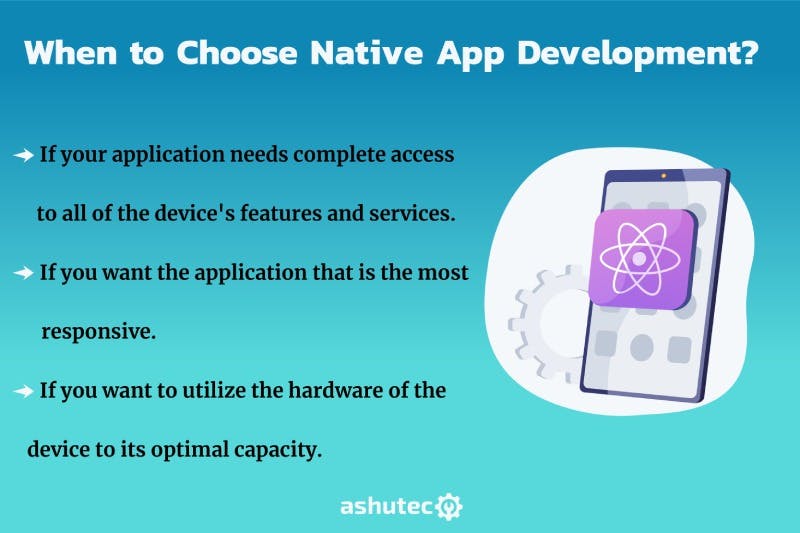
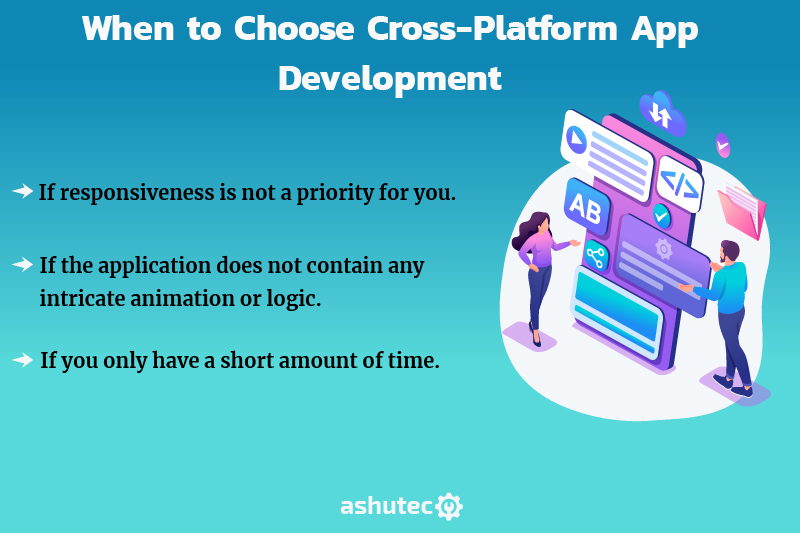
Now that the majority of people on earth have access to smartphones and mobile apps, they are the least interested in the technology utilized to create these apps. They are more focused on how the application will improve their lives than anything else.
The choice between native and cross-platform development is determined by the app's intended feature set and scope/timeline. Going native, on the other hand, is a clear decision if your business depends on your mobile application.
Get knowledgeable and experienced cross-platform app developers if you want to release cross-platform applications that are both aesthetically pleasing and highly efficient. The best course of action would be to hire developers from ashutec.
